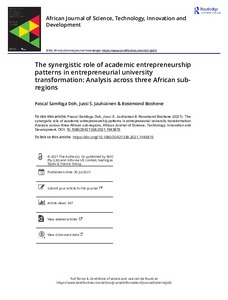The synergistic role of academic entrepreneurship patterns in entrepreneurial university transformation: Analysis across three African sub-regions
Boohene Rosemond; Doh Pascal Samfoga; Jauhiainen Jussi S.
https://urn.fi/URN:NBN:fi-fe2022012710621
Tiivistelmä
This study set out to establish entrepreneurship patterns in selected African universities and examine their potentials for institutional entrepreneurial transformation. The idea of the synergistic potential of entrepreneurship patterns with entrepreneurial university (EPU) concept influenced us. Our institutional sample comprised eight universities from three African sub-regions. We undertook document reviews, conducted forty-nine interviews and used content analysis. We found and established nine patterns, designed a holistic framework for the patterns and analyzed the dynamics and potentials. This synergistic approach, which is still marginal in the EPU literature, seemed truly relevant in the studied developing countries. Rather than borrowing pathways, the holistic framework addresses more effectively the different governance systems, meanings, resource mobilization processes, development contexts and business practices around the African universities. The framework constitutes a mirror, drawing board and director of attention and awareness for planning, analysis, review and funding of entrepreneurship in the studied countries. The article has practical implications for university managers who have the role to stimulate institution-wide entrepreneurship and make strategic choices. The article provides clear theoretical input to the higher education management literature, especially entrepreneurship management in developing countries which do not possess the institutional characteristics that have led to EPUs in higher-income countries.
Kokoelmat
- Rinnakkaistallenteet [19207]
